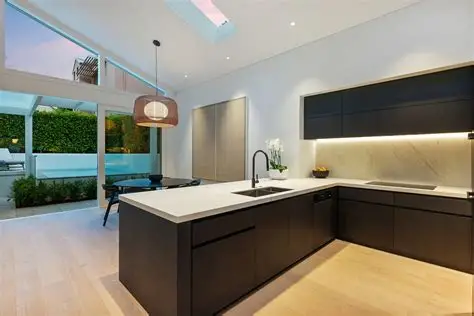Introduction
When planning a new kitchen or bathroom, granite and quartz remain the top contenders for homeowners seeking style, durability, and long-term value. Each surface has its strengths, drawbacks, and unique appeal, so deciding between the two is not simply a matter of taste—it’s about functionality, maintenance, cost, and lifestyle.
In this guide, we’ll compare these two materials side-by-side so you can confidently choose the best option for your home. For a deeper dive into fabrication and installation, see stone fabrication.

What is Granite?
Granite is a natural stone formed deep within the Earth’s crust from slowly cooled magma. Quarried in large blocks, it is cut into slabs, polished, and prepared for use in kitchens and bathrooms.
Characteristics of Granite
- Unique patterns: Every slab is one-of-a-kind, with distinctive veining and color variations.
- Durability: Extremely resistant to scratches and heat.
- Maintenance: Requires sealing every 1–3 years to prevent stains and moisture absorption.
- Design flexibility: Works with a wide range of cabinet styles and colors.
For more details on material comparisons, read is granite countertops cheaper or more expensive than marble/corian/concrete/solid surface?.

What is Quartz?
Quartz countertops are engineered stone, combining 90–95% ground quartz crystals with resins, pigments, and polymers. The result is a consistent, non-porous surface that requires minimal maintenance.
Characteristics of Quartz
- Consistency: Patterns and colors are uniform from slab to slab.
- Low maintenance: No sealing required; highly resistant to staining.
- Design variety: Can mimic natural stone or provide unique modern aesthetics.
- Durability: Scratch-resistant, though not as heat-resistant as granite.
Granite vs Quartz: Key Differences
| Feature | Granite | Quartz |
|---|---|---|
| Composition | 100% natural stone | Engineered with quartz, resin, pigments |
| Maintenance | Needs sealing | No sealing required |
| Heat Resistance | Very high | Moderate |
| Stain Resistance | Moderate | Excellent |
| Appearance | Unique patterns | Uniform and customizable |
| Price Range | $40–$200/sq ft | $50–$150/sq ft |
Which Looks Better?
Granite’s Natural Beauty
Granite’s charm lies in its organic variation—swirls, flecks, and veins that tell the story of its formation. A white granite countertop can brighten a space, while a black granite countertop adds a bold, luxurious feel.
Quartz’s Modern Appeal
If you prefer a seamless, consistent look, quartz is the winner. Manufacturers offer colors that mimic marble, granite, or completely unique tones unavailable in natural stone.
For additional reading, check is quartz better than granite?.
Durability and Maintenance
- Granite: Naturally strong, but can chip if subjected to heavy impact. Needs resealing to maintain its resistance to staining and bacteria.
- Quartz: Non-porous, so it won’t harbor bacteria or absorb liquids. However, it can discolor with prolonged UV exposure.
If durability is your top concern, explore which is better: marble or granite countertops?.
Heat and Scratch Resistance
Granite is extremely heat-resistant, making it a safer choice if you frequently place hot pots or pans on the surface. Quartz, while durable, can be damaged by high heat and is best protected with trivets or pads.
Stain Resistance
Because granite is porous, spills can seep in if not wiped up quickly—especially if the surface is not sealed. Quartz’s engineered composition makes it highly stain-resistant, perfect for busy kitchens.
Environmental Impact
Granite is a natural product, but quarrying can be energy-intensive. Quartz production uses resins and manufacturing processes, but it may contain recycled materials, offering a slightly different sustainability profile.
Cost Comparison
While pricing overlaps, granite offers a wider cost range.
- Entry-level granite is often cheaper than quartz.
- Mid-range options are similar in cost.
- Exotic granite slabs can exceed quartz prices.
For specific pricing details, see is quartz more expensive than granite?.
Resale Value
Both granite and quartz can increase your home’s resale value. Granite’s appeal lies in its natural uniqueness, while quartz attracts buyers looking for low-maintenance, modern surfaces.
Which Should You Choose?
- Choose granite if you want:
- A natural, one-of-a-kind surface
- High heat resistance
- An earthy, organic look
- Choose quartz if you want:
- Low maintenance
- Consistent design
- Superior stain resistance
For more comparisons, check is granite countertops cheaper or more expensive than marble/corian/concrete/solid surface?.
Final Thoughts
There’s no universal winner in the quartz vs granite debate—it comes down to your lifestyle, design goals, and maintenance preferences. Whichever you choose, working with an experienced fabricator ensures a flawless installation and long-lasting results.
If you’re ready to make a choice, explore the Aardwolf granite countertop collection, Aardwolf premium granite slabs, and Aardwolf granite pricing guide for premium options tailored to your needs.

